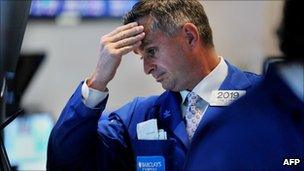A primer on the markets' descent
- Published
- comments

Wall Street's Dow Jones lost more than 4% in early trading on Thursday
I am a bit of a believer that when there is nothing new to say, it's best to keep schtoom. And there isn't really anything new to say about today's precipitous falls in share prices.
But not all of you have been sitting in the front seat of global stock markets' roller coaster ride of the past three weeks - mostly downhill with the odd 360 degree loop.
So here's a reminder of what's generating all that fear and loathing in the investment community.
The sequence goes like this: data shows the US economy is weak plus hints from regulators that European banks are fragile generates tumbling shares, every time.
The recession anxieties were exacerbated today by a higher-than-expected rise in new claims for unemployment benefits in the US and by data showing that factory activity in eastern Pennsylvania, southern New Jersey and Delaware has plummeted.
Confidence wasn't exactly boosted by a report from the US investment bank Morgan Stanley which downgraded projections for global growth and which also described the US and Europe as being "dangerously close to recession".
And then there was the failure earlier this week of President Sarkozy of France and Chancellor Merkel of Germany to do anything perceived to be substantive to quarantine European banks from the pernicious impact of eroding confidence in the ability of some eurozone government to repay all their debts.
(If you want to understand the transmission mechanism from the weakness of government finances to the weakness of banks, I wrote about it recently).
So when the Wall Street Journal reported this morning that US regulators have been meeting the American arms of big European banks to seek reassurance that they have sufficient access to funds to withstand systemic shocks, investors saw this not as reassuring, pre-emptive, evasive action by regulators but as confirmation that the banks are indeed ailing.
Anyway we are heading back to the share-price lows we plumbed before the European Central Bank and the US Federal Reserve did what they could last week to ward off a sovereign debt crisis in Europe and stem a return to economic contraction in the US (respectively).
Which for those who see markets as emotional rather than rational institutions, will revive fears that the down elevator for shares may not end its descent for some time yet.
Update 16:25: I forgot to mention that bank shares have been particularly weak (predictably).
In the UK, the share prices of Lloyds, Royal Bank of Scotland and Barclays have tumbled around 10% - and have all fallen more than 50% from highs reached earlier in 2011.
So in the past few months, well over £60bn has been wiped off the value of these three banks alone.